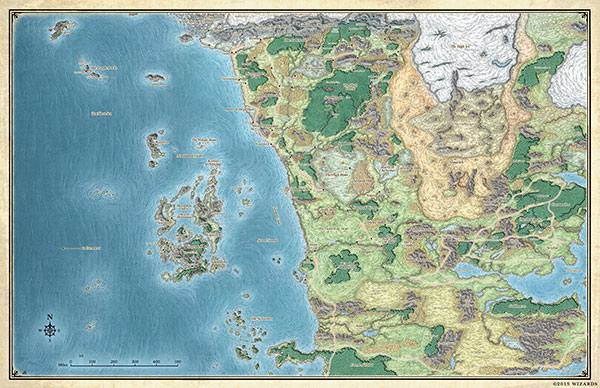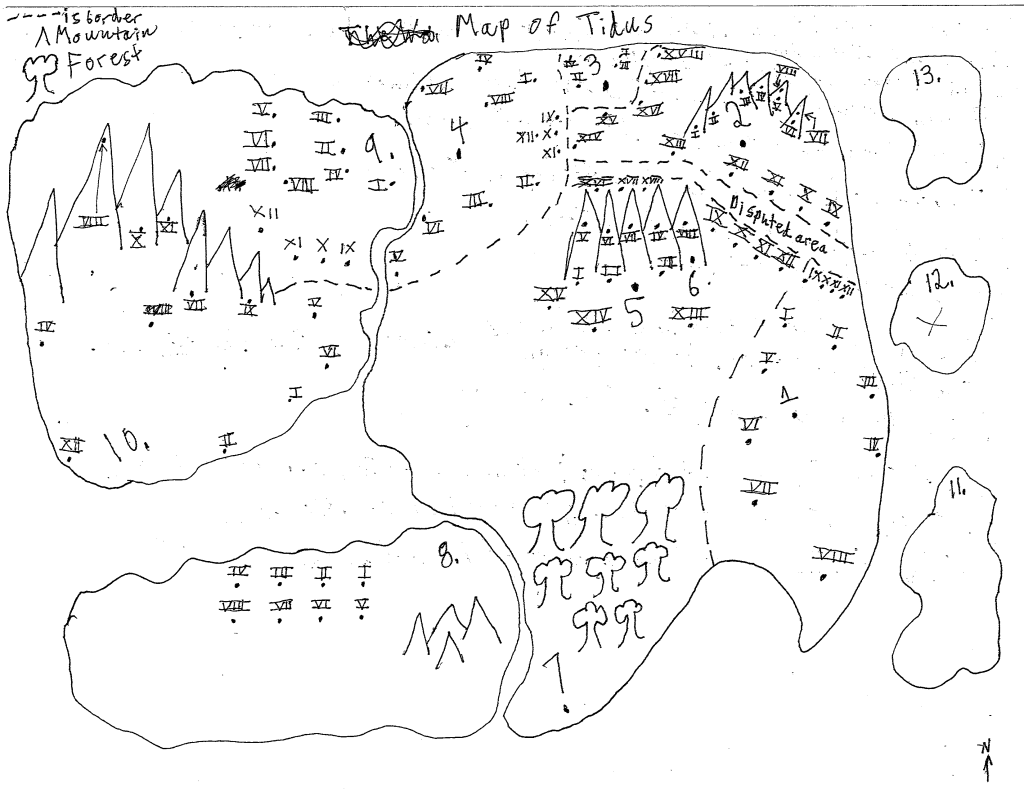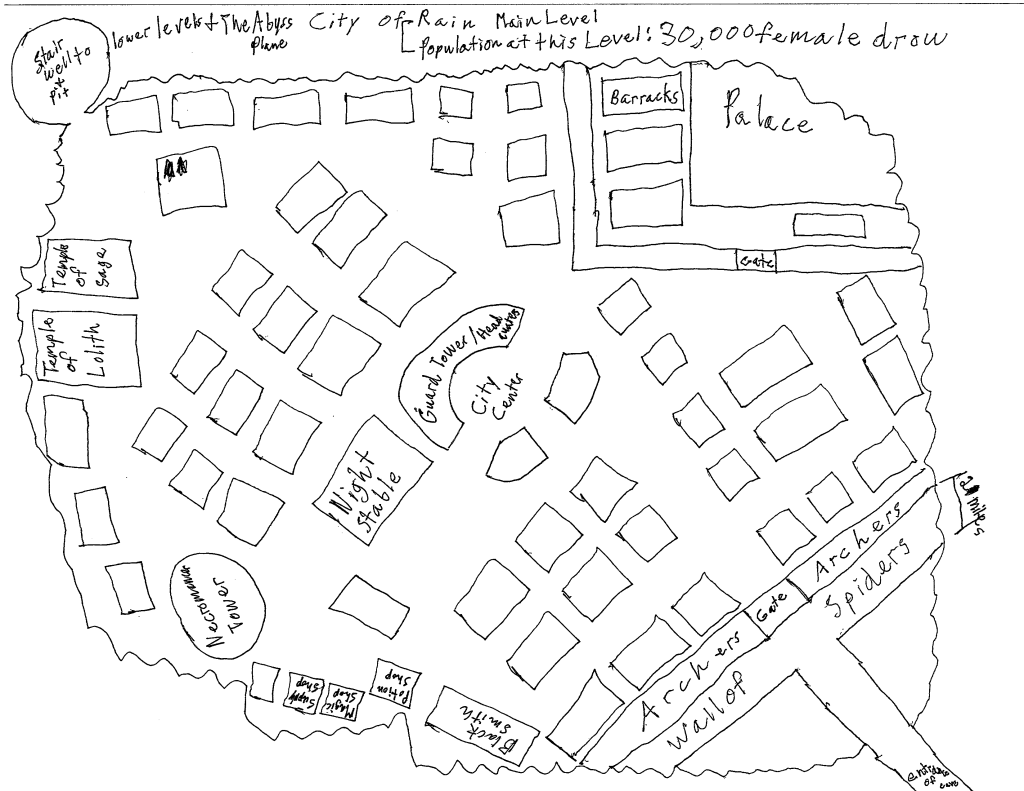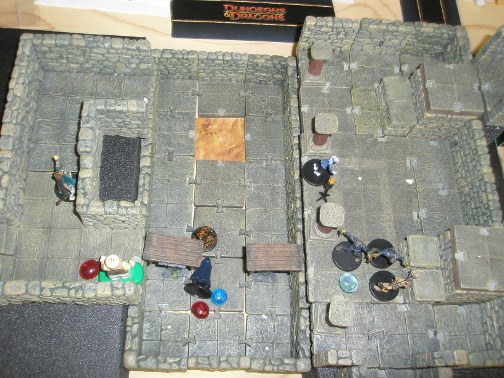It was requested that I help someone figure out how to be a Dungeon Master for Dungeons and Dragons. This first post will cover a lot of ground and will be updated/edited over course of several days until I feel like I've covered as much I can think of.
For Beginner's
What you need as Dungeon Master (DM):
1. Imagination
2. The Books: Players Handbook, Monster Manual, and Dungeon Master Guide
3. Dice: As the DM will will have have enough spare dice in case a player forgets their set. The dice you will need are d20 (a 20 sided die), d100 (usally two 10 sided die one just has extra 0, if you roll 00 on one and 7 on the other that's considered a 7. If you roll a 00 and a 10 that is a 100. They do make a golf ball d100 but I never used one.) d12 ( a 12 sided die), d10 (a 10 sided die), d8 (an 8 sided die), d6 (a 6 sided die), and d4 (a four sided die)
4. Pencils and Erasers.
5. Character Sheets for all the players. (You can design your own or if you ask, I can give you a link to character sheets that I made for 3.5 edition, Pathfinder, 5th edition, and the Revised 5.5).
6. People ( Recommend only up to 5 (Not counting yourself, any more and you will run into issues.)
Important Suggestion:
NEVER EVER MAKE A CHARACTER THAT PLAYS ALONGSIDE THE PARTY.
Which Edition should you Run?
Pathfinder or 5th edition are what I'd recommend to a starting Dungeon Master.
Terminology:
Campaign - This is the world your players will play in. You can have a single goal for the group to accomplish or you can have it be organic and open ended.
Session - This is the time frame in which you play the campaign. A session last 2 to 8 hours (depends on Dungeon master. The longest I go is 3.) The time that passes in game is dependent on how fast you want it to go.
Natural 20 - A player or you rolls a 20 on a d 20.
Types of campaigns
One Shot: The campaign last one session. Most likely you run with premade characters (Played by players). These can be fun with veteran players but not with new players and a new dungeonmaster.
Modules: You can buy modules that have everything you need for running a campaign. Monsters, npc, loot, map, story, it's all taking care of. The players can even make there own characthers. example:
for 5th edition. These are a great for Dungeon Master who is brand new.
Sandbox: You've played open world RPG video games, same concept, except, the adventure never ends. Now you have a few options within sandbox. You can set it in an establish Dungeons and Dragons setting like
which gives you the Dungeon Master what you need to run a campaign in a part of the very popular Forgotten Realms. You could also create your own world which does take time. I strongly advice if you are brand new on not creating your own world just yet. You still need to learn the fundamentals of running a campaign.
The chandler effect:
Now this is important concept to understand as a Dungeon Master. You need to understand that the players can do what I call the chandler effect. Example: I as a DM say to the player - You are in the dining hall of the castle, when you are rushed by guards. What does your character do? The player says - I cut the rope to the chandler. Notice I did not say this hall had a chandler. However, it is within reason that there would be one. As a DM I would allow the player to take this action because it is within reason. This is just one example of the chandler effect. It's basically the player taking an action that is within reason that you might not have thought of.
How to recruit:
You can go to your local comic book shop and see if they have a weekly Dungeons and Dragons group there. You'd likely meet people who would be will to take part in a campaign. https://roll20.net/ allows for you to let people know your looking for people and you can run a campaign using the tools they have. You still need the books but this would allow for you to play with people across the nation. I've heard good things about it but I've never used it.
Role Playing and Meta :
There is what the player knows and then there is what the character knows. Example: Player knowledge means a player might know hey joe who is a ranger is across town and I have to go meet him. But the character would have no knowledge of this and the player should roleplay according to that knowledge. If the player acts on player knowledge I refer to it as and meta and I completely ban it. I do set the ground rules at the start of the campaign and explain not to be meta.
Pathfinder vs Dungeons and Dragons:
What is Pathfinder? Well, Pathfinder became really popular when 4th edition of Dungeons and Dragons came out. 4th edition is widely hated by some veterans of Dungeons and Dragons. Many of the reason include dumbing done combat, it was too mmo like, etc. Pathfinder addressed severally of the problems of 3.5 edition of Dungeons and Dragons. Some DM's refer to Pathfinder as 3.75 Dungeons and Dragons. Pathfinder gives the players alot of options on how to build their characters. It also has everything you need to run a campaign in one book. 5th edition of Dungeons and Dragons combines some elements of Pathfinder with the best parts of 4th edition and with some stuff from 3.5 edition. Combat is a lot smother in 5th edition and throwing monsters at the party isn't nearly as much of a chore as it use to be.
So which should you run? My advice is if you can go observe a 5th edition session and a Pathfinder session. After the session is over go over and talk with DM about how your thinking of running a campaign but you want to ask them for some advice first. Then ask questions you have. You'll have to figure out which system sounds like something you'd want to run as a DM. Both of them are good in my opinion each with their own pro's and cons.
Class you should ban as a Starting DM:
Psions. As a starting DM, you are not ready to handle to special class of Psion. Why are they so special? Psion can do the following eventually: Delevel (Yes they can drain someone's or somethings levels, this is no joke), Make their own plane, Stop time, warp realty, etc. With that said since you ban the class you cannot have any psions in your world. Rule of thumb if you ban players from have access to a class or magic item, you cannot use those items or play as that class.
Planned Combat/encounters and Random Encounters
Planned combat is monsters/characters that plan to encounter the party. What doesn't a party always fight monsters? Nope. As a DM you should allow the party the opportunity to roleplay as much as possible which means they could convince some monsters to not fight the party.
Random Encounters are what happens outside of cities while traveling or camping. I have one of the party members roll a d100 and then I roll a d100. If they roll higher than what I roll, then no encounter happens. If they don't, then an encounter happens: The encounter doesn't have to be a monster or bandit, it could be a traveling caravan, or a traveling merchant. It's at my discretion.
What to do when combat happens
There are two types of combat that can happen:
Surprise attack either the party or creature/person do. The only thing that makes surprise attack is that whoever does it gets to go first then everybody rolls initiative.
Normal Combat is made of rounds each round is equal to 6 seconds in game time not real world.
Round 1
Phase 1 - Everybody rolls initiative. Initiative is roll 1d20 plus the dexterity modifier. The highest roll goes first, then 2nd highest goes 2nd, and so on. You as the DM should roll for ever creature or person you have fighting the party.
Phase 2 - Move or attack or action. A player/creature/npc can normally move 30 feet and attack at least once. They may also take an action which could be: Drink a potion or cast a spell. At higher levels players or creatures will be able to attack more than once. However if they move and then attack they only get one attack. Player/Creature/NPC's turn would end. Next player/creature/npc goes.
That's the basics of a round.
Now onto things to keep in mind:
A player nor you can target one part of a body like the head. You nor the player can say where the attack lands.
Threat range: If a player/creature goes into the threat range of a player/creature, Then that player/creature gets an attack of opportunity.
Spell Duration: Some spells last a certain amount of time that is why each round equals 6 seconds.
Please read the Players Handbook (Page Number to Be inserted) and Dungeon Master Guide (Page Number to Be inserted) for further information on combat.
Role of Deities or religion
Questions you should ask: What role do deities or religion play in the campaign? Are the deities real or not? If they are real do they visit the mortal realm? Do they play favorites? Have holy quest/crusades happened as a result of deities or religion?
There are some interesting things that you as a dungeon master can present for potential role-playing experience/character development. How a player roleplays their character's religion is p to them but it is your responsibility to inform them of the common practices and beliefs of the religion.
Setting the Rules for Creating Characters for players
In the official rules of Dungeons and Dragons, you have two methods for character creation. The rolling for stats systems or the point buying system. You as a Dungeon master need to choose which system to use.
Rolling stats - Random, you have to be there when they roll the dice for stats, they can end up with a really powerful or weak character.
Point buying - Really easy, you don't have to be there, the character will be somewhere in the middle with one really great stat.
What your role is with Players
You can't have a campaign without players. The big question is what should your relationship be with the players. I like to think of it like you are the director and the player is an actor. You describe the scene, portray some of the characters/monsters, and the player acts as the character according to that information. The thing is you really should shouldn't remove the ability to choose how to handle a situation. Example from my last campaign:
The players were in the drow kingdom and saw how horrible it was. The male drow were slaves. One of the players was working for the captain of the guard. That player had learned the captain was not pleased with the current ruler. That player informed the group and suggested that the players cause a coupe with Captain of the guard becoming the new ruler.
I never suggested to the players to stage the coupe or even attempt it. They were successful and it was a great roleplaying moment. That's what I mean by allowing the player to have choice. If they go a different route but it's something their character would do, then you should allow the player to do it.
Each player needs a moment to shine
Each of the player needs to have moment where their character is in the spotlight. IF the campaign just stays focused on one player the whole time, it creates isolation for the other players and it makes things really boring. Each character has desires, dreams, a history. It's really fun to present roleplay experiences for those and allow for the character to progress and grow in a way.
Addressing player concerns
Your player may have an issue with a session or how things are going for their character. At the end of each session, I always let the players know any of them were welcome to speak to me either one on one or in front of the group about any issues or concerns. Then if any of them had concerns or issues I would listen to them and discuss with them ways I could fix the concern or issue. Players need to know they can take with the Dungeon master about concerns or issues they have.
Power players/How to handle them
Power players are players that want the spotlight to stay on them. Also they want to do really epic things before their character is ready. The best way to handle them is to take to them the first time it happens one on one after a session is over. Discuss the issue with them and see if they can come to understand. If that doesn't resolve the issue very politely ask them to leave the group.
Don't Place Yourself in What I Call Dragon Cancer Crisis
Here is important thing to keep in mind. Just because an item exist in the Dungeon Master Guide or a Spell Exist doesn't mean you should allow for it or use it yourself. Let tell you a story of a big mistake I made as a novice Dungeon Master that I refer to as the Dragon Cancer Crisis:
A level 10 wizard was fighting a dragon by himself. Because of just three spells the wizard took control of the dragon. ... I knew I couldn't allow a level 10 wizard control a dragon. It'd be dangerous and a headache. So I had it die. The player asked how it died. I said Dragon Cancer. After that I banned those spells and book from all campaigns. My point is you should read over all the spells and items and understand what they do. The further you get away from core rule books the greater the risk of a Dragon Cancer Crisis happening.
For Advance DM's
Creating Magic Items
Magic Items exist in Dungeons and Dragons or Pathfinder. Have you ever thought about making your own? If you have there a couple things to keep in mind:
How powerful is it?
Example: Immovable Rod. The Immovable Rod is pretty awesome in my opinion and well balanced. With one you can put in front of a door to keep it shut unless a wizard cast dispell magic but they'd have to figure out it's being held shut by a magic item. Not really game breaking in my opinion. with a couple you can make a later.
What does it do?
Each magic item has a function where it does something like teleport, buff, transform, dispell, etc all based on spells that exist in Dungeon and dragons.
What are it's limits?
Some magic items can only be used so many times then they stop working. Some can be used indefinitely. Others once per day.
What is the lore for the magic item?
Some magic items where made by a great wizard. Lore for magic items can provide immersion for the player. Each magic item doesn't have to have lore but really powerful named magic weapons or armor probably should have some type of lore.
Is it balanced?
Magic items need to be balanced. Think of a magic item as tool or aid not a I destroy everything in one hit item.
Does something like this already exist?
If you have n idea for a magic item look to see if it already exist in the Dungeon Master Guide. If it does just use that. No need to do extra work for something that already exist.
Creating a Story for the campaign
Treat the story of a campaign like an arc of a book. Is the story for the campaign save the world or more stop an evil necromancer? It doesn't have to be a grand idea for a story. Some of the best campaigns I played where fairly simple. Remember your players have freedom, if they want to go hunt pirates let them. Adapt the story of the campaign to allow for the players to feel like they apart of a living breathing world not just a singular story. These side stories don't have to tie into the main quest line.
Basic Map Drawing
Look at official maps first
A good idea before creating your own world is to look at examples of official Dungeons and Dragons maps. Example Official Sword Coast Map:
I know the map image is small but notice how there is a compass and a measurement of distance. You as Dungeon Master need to know how long it takes to travel from one place to another. Your map doesn't have to be as detailed this. You can just have the shape of the land drawn some features like mountains, mountains, borders.


Now I didn't draw a ruler to mark distance on the map but I knew how long it would take to travel from one place to the next. Notice how even though the maps I drew aren't the most well drawn they give the player the idea of the shape of the world they are in. You don't have to be an artist to draw maps.
How to Handle a Campaign that has Psions
Never ever let someone who is learning how to play Dungeons and Dragons, play a Psion character. What are Psions? Psions are a class that potential can create their own plane. They can attack using their mind. They are kind of like Jedi from Star Wars. They can de level someone. They can mentally crippling someone. Granted a lot of that is at higher levels but still. So how do you run a campaign where a player is playing a Psion character?
First, the most effective way to fight a Psion is with other Psions and Psionic creatures. You as a Dungeonmaster have to know how to play a Psion. You need to know what they can and can not do. If you don't, do not run a campaign with them in it till you do.
Traversing the Planes
Do you want to run a campaign that involves traveling the planes of existence? There are a couple things you need to understand
What is a plane?
In Dungeons and Dragons Term a plane is another dimension connected to the main dimension. Some of them are where a deity lives. Some planes have special rules [At least in 3.5 they do.]
What is the plane like?
Each plane is different from another. Some are similar to the main plain. Others are very dangerous to travel like the Abyss.
What lives in the plane?
You need to know what lives in the plane. What are the creatures? Will they attack on site? Can they be reasoned with.
Traveling planes can be a fun thing to do with mid level characters [level 10] and high level [20 and up]. Just research the planes you want to feature and prepare for it ahead of time.
For Veteran DM's (To Be Edited)
Creating Classes
Creating Races
Creating Monsters
Creating Spells
Creating Planes
Creating Deities
Useful links:
Official 3.5 character sheets
Official 5th Edition Character Sheets
Pathfinder Character Sheets
Note: I'm going to keep editing and adding stuff to this post but feel free to ask questions and I'll answer.


